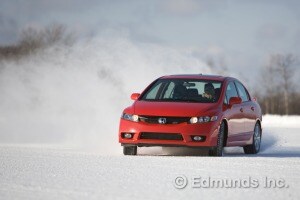Edmunds dealer partner, Bayway Leasing, is now offering transparent lease deals via these forums. Click here to see the latest vehicles!
Options
Tire Test: All-Season vs. Snow vs. Summer
 Edmunds.com
Member, Administrator, Moderator Posts: 10,315
Edmunds.com
Member, Administrator, Moderator Posts: 10,315
 Tire Test: All-Season vs. Snow vs. Summer
Tire Test: All-Season vs. Snow vs. Summer
Are snow tires a disaster on dry pavement? And how about summer tires in the snow? Should you just buy all-season rubber and not worry about the weather? These are just a few of the questions we tried to answer.
0

Comments
Snow tires are meant to be used in temperatures below 40 degree Fahrenheit.
If the Arizona and California test were done in temperatures above 40 degrees, which seems obvious and isn't addressed in the article, then these results are completely useless.
The purpose of testing the winter tires in warmer weather was to demonstrate that you must switch. You can't leave them on all year. It also illustrates the difficult choice faced by folks in southern California, the Bay Area and other warm areas that are within easy driving distance of snowy mountains for weekend recreation. Those of us in those areas are probably unable to use snow tires--we must use chains.
Twitter: @Edmunds_Test
This article appears to be misleading, if not completely useless, and should be removed. Snow tires are meant to be used in temperatures below 40 degree Fahrenheit. If the Arizona and California test were done in temperatures above 40 degrees, which seems obvious and isn't addressed in the article, then these results are completely useless.
____________________________________
Are you drunk?
I live in New England and it snows a lot in the winter, It was also 65 degrees two days ago, should I have changed tires?
Well, since I still have to drive in the snow sometimes I guess I will stick to all seasons except when I have a summer only car registered.
Winter tires provide better performance in winter which often includes rain and slush; not just snow.
Summer tires are actually three-season tires. They mention that. Snow tires are actually the fourth-season, winter, tires...
Few years ago a friend gave me the advice to buy snow tires, instead jumping to an expensive 4x4 purchase. I do not regret for a minute, listening to his advise. Owning two set of tires have saved me on tire wear, the tires last longer. Having to buy a gas guzzler SUV and pay twice more for gas.
In conclusion, If you have a car and have 3-4 months of cold snowy weather. Your Honda Fit is as good as the the neighbors 4x4. All you need is snow tires. (and a secret from me, smaller diameter tires are cheaper)